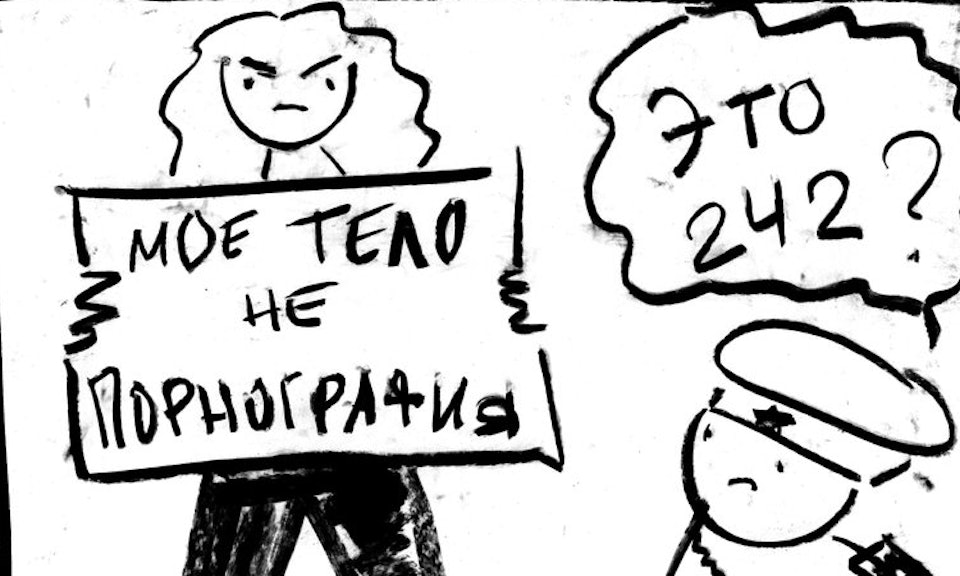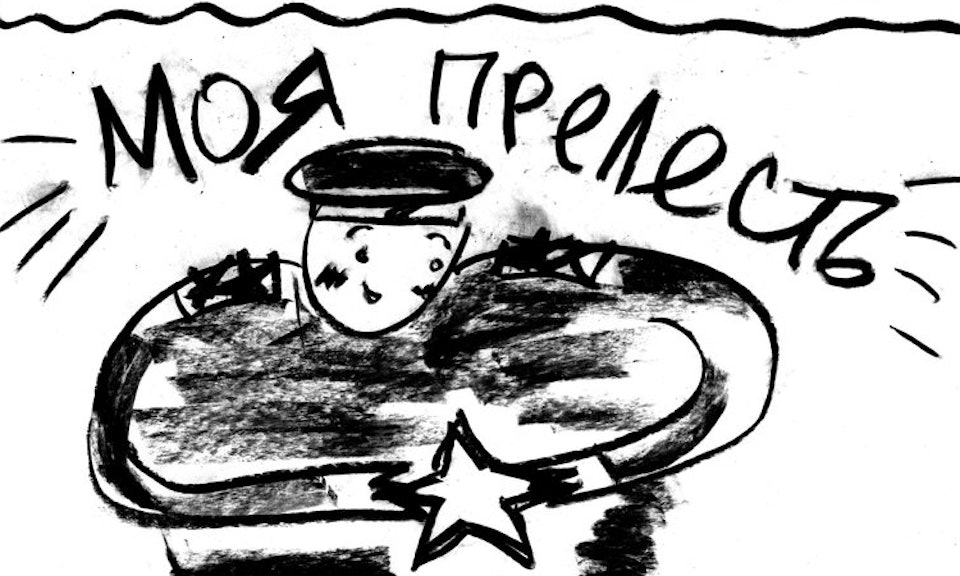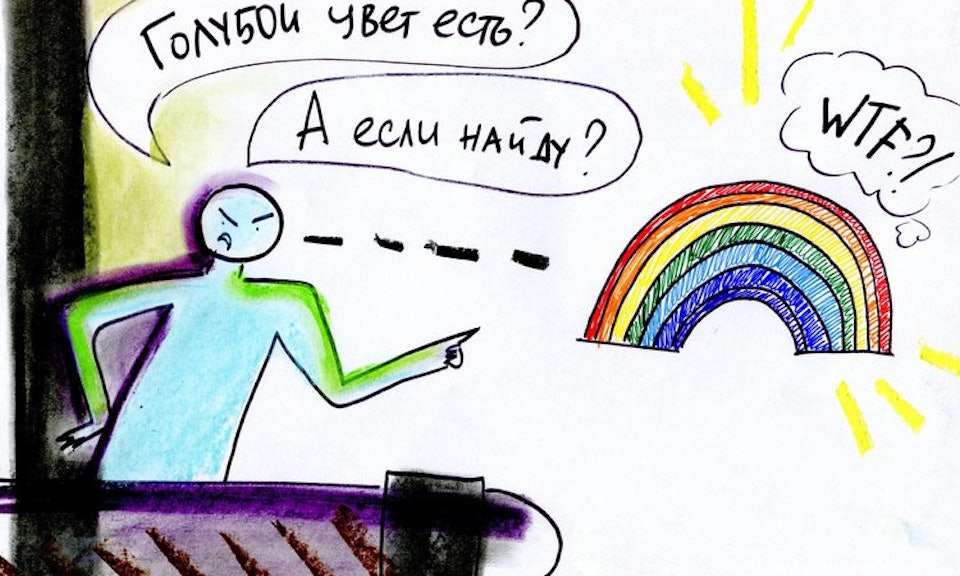Artist Profile
Yulia Tsvetkova
Russia
Status: On Trial

UPDATE: On July 14, 2022 it was announced that Yulia Tsvetkova had been acquitted on all pornography charges. An appeal has not been filed.
UPDATE: The criminal case against Yulia Tsvetkova was approved by the Prosecutor's Office in Komsomolsk-on-Amur in January 2021. Tsvetkova was formally charged with "creating and distributing pornographic materials" under Article 242 of Russia’s Criminal Code. Her trial was closed to the public as of April 2021 and adjourned in November 2021 to resume in March 2022. On June 3, 2022, Tsvetkova was added to the Russian justice ministry's list of "foreign agents."
UPDATE: On Saturday, June 27, 2020 over 30 activists were reportedly arrested for protesting Yulia Tsvetkova's trial.
At a recent exhibition in Moscow, artist and activist Katrin Nenasheva invited fellow Russian female artists to discuss topics of “female sexuality, freedom, and security.” The exhibition was held in honor of Yulia Tsvetkova, a 27 year-old visual artist, whose house arrest and potential prison sentence has become a cause celebre among Russian artists and activists. The gathered artists’ works explicated the line between pornography and fine art. Many of their drawings and paintings featured nude female figures, often echoing the style of Tsvetkova’s pieces: harshly realistic, wrinkled, bleeding. One especially evocative piece called Needle Bed, by artist Katya Iosilevich, featured a sculpted vulva stabbed repeatedly with needles. The artist described it as a commentary on “the daily mundane invisible suffering that women are doomed to in a patriarchal society." Clearly, Tsvetkova is not the only artist concerned with the depiction and treatment of women and the female body in Russia today.
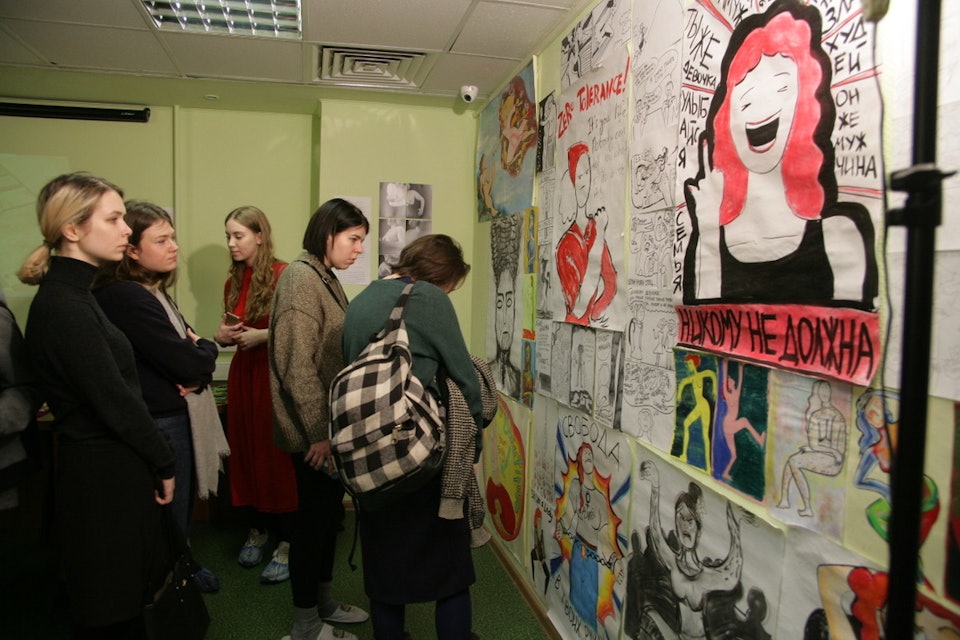
Yulia Tsvetkova who received the 2020 Index on Censorship Freedom of Expression Awards Arts Fellowship is on trial. If found guilty — as more than 99 per cent of people who face court in Russia are — she will face six years in prison. But this is a trial being closely watched by Russia’s creative community. Tsvetkova is an artist. She is also being prosecuted for feminist drawings that she posted on social media.
Yulia Tsvetkova’s career as an artist began early and auspiciously when, from the ages of twelve to fourteen, her “whole town” came to view a series of paintings she produced with acrylic paint and crayon. Her standing in the community has changed drastically since then: “All the local papers wrote about me – the wonder-girl – and my wonderful mother – now, 15 years later, we are enemies of the people.” Tsvetkova’s transformation from “wonder-girl” to persona non grata in her hometown of Komsomolsk-on-Amur, in Russia’s Far East region, came about because of her work as an LGBTQ activist and feminist artist and theater director. In a country where the government widely bans depictions of LGBTQ relationships as “propaganda,”, Tsvetkova’s frank examinations of female bodies, combined with her activism and educational efforts on behalf of the LGBTQ community, have been the object of scrutiny and, eventually, criminal charges, alienating her from her community and demonstrating the severity of institutionalized homophobia in Russia.
Tsvetkova has described her initial forays into paintings as “primitivist” in style, and resonances of this early self-classification can be seen in her more recent output. Her “Vagina Monologues” Facebook page, for instance, features an array of vulva-centric artworks, ranging from embroidered vaginas to delicately drawn nude female bodies. Primitivist style often emphasizes simplistic line drawing, and Tsvetkova utilizes the power of the style’s simplicity to highlight the message of her art: the reality of the female body. These works aim to normalize female bodies, depicting figures with wrinkles and hair, menstruating and sweating. For an American art audience, this brash exploration of the female body as a site of aesthetic beauty and power harkens back to the second-wave feminist artworks of artists like Miriam Schapiro and Judy Chicago, whose “central core imagery” artworks spawned a generation of female artists eager to explore their own bodies through art. For Russian artists like Tsvetkova, though, this frank depiction of female bodies carries serious risks.
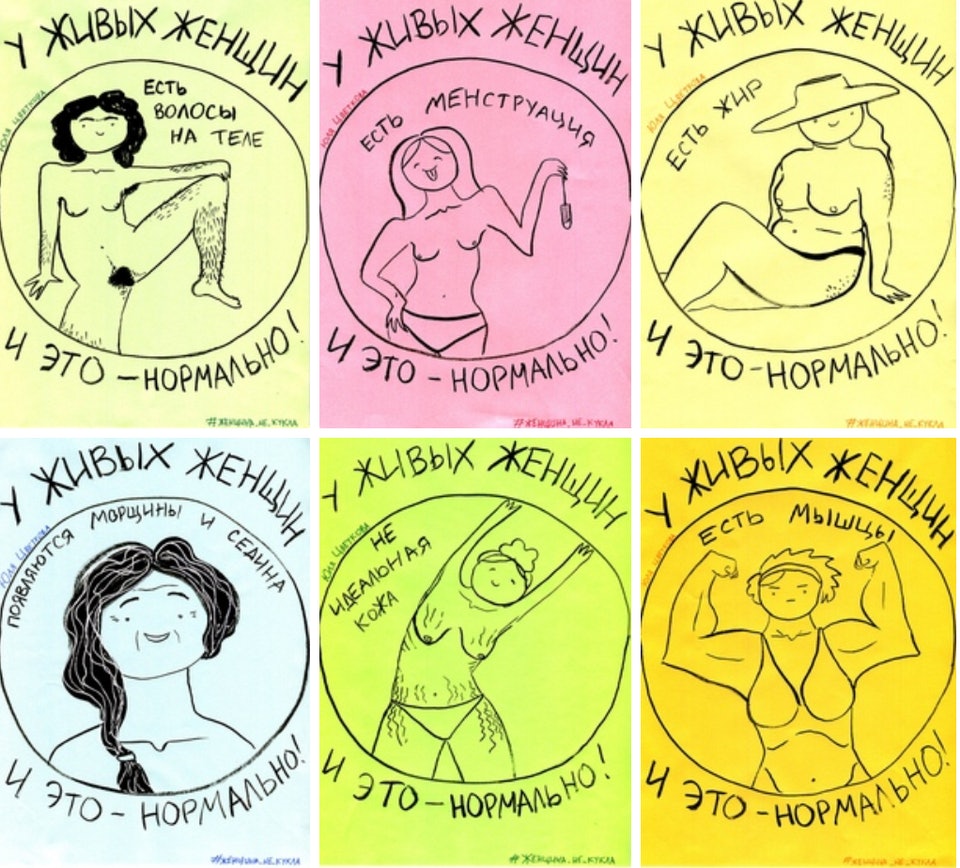
In 2013, the Russian Duma passed an ammendments prohibiting “propoganda of non-traditional sexual relations among minors.” The legislation, titled “For the Purpose of Protecting Children from Information Advocating for a Denial of Traditional Family Values,” was an amendment to the 2010 “On Protection of Children from Information Harmful to Their Health and Development” content law. Since then, the law has been used on countless occasions to crackdown on LGBTQ and feminist activists and artists. Violence against LGBTQIA+ people has reportedly doubled in the regulation’s wake.
For Tsvetkova, an artist interested in the social and political effects of art activism, this amendment proved to be especially damning, particularly in regards to her work as an LGBTQ activist. Tsvetkova was eventually placed under house arrest for her art and activism after a lengthy campaign of harassment by Russian authorities. In March of 2019, Tsvetkova left her job as a youth theater director after her anti-bullying show, “Blue and Pink,” came under investigation for dispersing “propoganda of non-traditional sexual relations among minors.” Later in 2019, Tsvetkova was accused of “distributing pornography to minors” for her role as an administrator of two online LGBTQ communities on the popular Russian social media site VKontakte.
Tsvetkova was initially fined for her online activity, and was then formally charged in January 2020 for posting a drawing online with the caption, “Family is where love is. Support LGBT+ families,” which was shared “in support of a same-sex couple who had had to flee Russia with their adopted children because the authorities had threatened to take their children away from them.” Under the Russian government’s broad umbrella definition of “non-traditional” sexual relations, much of Tsvetkova’s LGBTQ activism, including her local online sex education resources, has been criminalized as distribution of pornography among minors, despite the fact that her online educational efforts were on “18+” websites. While the government lifted Tsvetkova’s house arrest in early March 2020, she continues to face the potential of a six year sentence and it is unclear when her trial will officially begin.
Censorship breeds self-censorship, as Russian artists struggle to evade persecution for works that explore taboo subjects. Tsvetkova has already felt the self-regulatory effects of her treatment by authorities, saying, “Some germ of fear or uncertainty has appeared... while I am painting on very abstract topics.” But Tsvetkova remains convinced of the power, and necessity, of making art that challenges social norms: “My views have not changed, and I will transform everything that happens to me into artistic forms.”
By Annie Kiyonaga, June 2020. Annie is a recent graduate from University of North Carolina at Chapel Hill, where she studied art history and literature. She currently lives in New York, where she’s working for an education non-profit.
